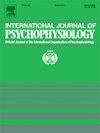你值得等待吗?等待时间调节社会反馈加工:来自事件相关电位的证据。
IF 2.5
3区 心理学
Q3 NEUROSCIENCES
引用次数: 0
摘要
处理社会反馈对于建立适当的社会联系至关重要。然而,社交反馈并不总是即时的,等待时间对社交反馈处理的影响仍未被探索。利用脑电图(EEG)和事件相关电位(ERPs)研究了等待时间对N170、奖励正性(RewP)和P3的影响。参与者(N = 36)完成了一项社会评估任务,等待喜欢和不喜欢的同伴的反馈,等待时间短(800-1200 毫秒)或长(5000-6000 毫秒)。参与者更有动力从喜欢的同伴那里得到反馈,他们认为被喜欢的同伴接受比被拒绝更令人愉快。值得注意的是,参与者发现,在得到喜欢的同伴的认可时,等待更长的时间更值得,但在等待不喜欢的同伴的反馈时,等待更长的时间就不值得了。脑电图结果显示,等待来自喜欢的同伴的反馈时间越长,RewP越高;相反,等待来自不喜欢的同伴的反馈时间越长,RewP越低。此外,N170和P3对等待时间敏感,长等待时的振幅大于短等待时的振幅。总的来说,本研究表明,等待时间对社会反馈加工的影响存在差异,这反映在N170、RewP和P3的变化上。我们的研究结果表明,等待时间的增加并不一定会降低奖励价值;它可以根据主观的社会偏好来增强它。在长时间的等待中,N170和P3振幅的增加可能表明注意力和记忆需求的增加。这项研究促进了我们对社会决策背后的神经认知机制的理解。本文章由计算机程序翻译,如有差异,请以英文原文为准。
Are you worth the wait? Waiting time modulates the social feedback processing: Evidence from event-related potentials
Processing social feedback is essential for establishing appropriate social connections. However, social feedback is not always immediate, and the impact of waiting time on social feedback processing remains unexplored. Using electroencephalography (EEG) and event-related potentials (ERPs), the present study investigated how waiting time affects the N170, reward positivity (RewP), and P3. Participants (N = 36) completed a social evaluation task, awaiting feedback from liked and disliked peers with short (800–1200 ms) or long (5000–6000 ms) waiting times. Participants were more motivated to receive feedback from liked peers, and they rated acceptance from liked peers as more pleasant than rejection. Notably, participants found longer waits more worthwhile when receiving acceptance from liked peers, but less worthwhile when awaiting feedback from disliked peers. EEG results revealed that the RewP was increased for long waiting times for feedback from liked peers, and, conversely, reduced for long waiting times for feedback from disliked peers. Additionally, N170 and P3 were found to be sensitive to waiting time, with larger amplitudes for long compared to short waits. Overall, this study demonstrates that waiting time differentially affects social feedback processing, as reflected by changes in the N170, RewP, and P3. Our findings suggest that increased waiting time does not necessarily reduce reward value; it can enhance it depending on subjective social preferences. The increased N170 and P3 amplitudes during longer waits may indicate heightened attentional and memory demands. This study advances our understanding of the neurocognitive mechanisms underlying social decision-making.
求助全文
通过发布文献求助,成功后即可免费获取论文全文。
去求助
来源期刊
CiteScore
5.40
自引率
10.00%
发文量
177
审稿时长
3-8 weeks
期刊介绍:
The International Journal of Psychophysiology is the official journal of the International Organization of Psychophysiology, and provides a respected forum for the publication of high quality original contributions on all aspects of psychophysiology. The journal is interdisciplinary and aims to integrate the neurosciences and behavioral sciences. Empirical, theoretical, and review articles are encouraged in the following areas:
• Cerebral psychophysiology: including functional brain mapping and neuroimaging with Event-Related Potentials (ERPs), Positron Emission Tomography (PET), Functional Magnetic Resonance Imaging (fMRI) and Electroencephalographic studies.
• Autonomic functions: including bilateral electrodermal activity, pupillometry and blood volume changes.
• Cardiovascular Psychophysiology:including studies of blood pressure, cardiac functioning and respiration.
• Somatic psychophysiology: including muscle activity, eye movements and eye blinks.

 求助内容:
求助内容: 应助结果提醒方式:
应助结果提醒方式:


